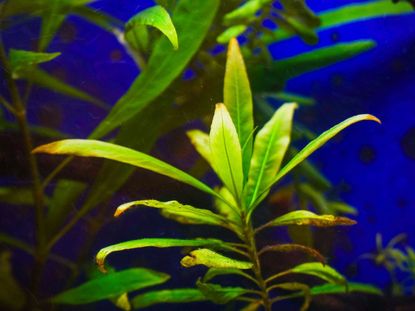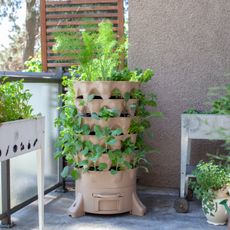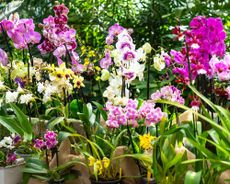Hygrophila Plant Care: How To Grow Hygrophila In An Aquarium


Looking for a low maintenance but attractive plant for your home aquarium? Check out the Hygrophila genus of aquatic plants. There are many species, and while not all are cultivated and easy to find, you’ll be able to track down several options from your local aquarium supplier or nursery. Hygrophila plant care is easy in freshwater tanks.
What are Hygrophila Aquarium Plants?
Hygrophila in an aquarium makes a nice decorative element, adding depth, color, texture, and places for your fish to hide and explore. The genus contains several species of aquatic flowering plants that grow mostly submerged in fresh water. They are native to tropical regions. Some of the species you’ll easily find include:
- H. Difformis: This is native to Asia and is great for beginners. It grows up to 12 inches (31 cm.) tall and helps prevent the formation of algae. The leaves are fern-like.
- H. corymbose: Also easy to grow, this species does require a little pruning. Without taking off new growth regularly, it will begin to look bushy and messy.
- H. costata: This is the only species of hygrophila native to North America. It needs bright light.
- H. polysperma: One of the most common species in aquarium cultivation, you’ll find this plant in most supply stores. It is native to India and very easy to grow. Unfortunately, it has become a problematic invasive in Florida, but it works well in aquariums.
Do Fish Eat Hygrophila?
Fish species that are herbivores will likely eat the hygrophila you plant in your freshwater aquarium. If you are mostly interested in cultivating plants, choose fish that won’t do too much damage.
On the other hand, you can plant hygrophila and other types of plants with the intent of feeding your fish with them. Hygrophila grows pretty fast, so if you plant enough in the aquarium, you should find that it keeps up with the rate of fish feeding.
The species of fish you choose also makes a difference. Certain fish grow rapidly and eat a lot. Avoid silver dollars, monos, and Buenos Aires tetra, all of which will devour any plants you put in the aquarium.
How to Grow Hygrophila
Hygrophila fish tank growing is simple enough. In fact, it’s hard to make mistakes with these plants, which are very forgiving. It can tolerate most types of water, but you may want to add a trace mineral supplement once in a while.
For substrate, use gravel, sand, or even soil. Plant into the substrate and watch it grow. Most species look and grow best with occasional pruning. Also, be sure that your plants have a good light source.
Gardening tips, videos, info and more delivered right to your inbox!
Sign up for the Gardening Know How newsletter today and receive a free download of our most popular eBook "How to Grow Delicious Tomatoes."
These species of water plants are not native to the U.S., so avoid using them outdoors unless you can contain them. For instance, grow hygrophila in containers that you set in your pond to make sure they don’t spread and take over native wetlands.

Mary Ellen Ellis has been gardening for over 20 years. With degrees in Chemistry and Biology, Mary Ellen's specialties are flowers, native plants, and herbs.
-
 Clever Vertical Vegetable Garden Ideas For Small Spaces – 7 Ways To Save Space
Clever Vertical Vegetable Garden Ideas For Small Spaces – 7 Ways To Save SpaceShort on garden space? Learn some vegetable garden ideas for small spaces that are fun and easy.
By Mary Ellen Ellis
-
 26 Different Types Of Orchids – With Pictures & Information
26 Different Types Of Orchids – With Pictures & InformationDiscover stunning orchid types to grow in your home and garden – from easy beginner varieties to rare and exotic species that are the preserve of experts.
By Melanie Griffiths